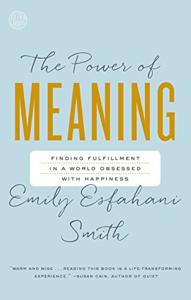
Want to learn the ideas in The Power of Meaning better than ever? Read the world’s #1 book summary of The Power of Meaning by Emily Esfahani Smith here.
Read a brief 1-Page Summary or watch video summaries curated by our expert team. Note: this book guide is not affiliated with or endorsed by the publisher or author, and we always encourage you to purchase and read the full book.
Video Summaries of The Power of Meaning
We’ve scoured the Internet for the very best videos on The Power of Meaning, from high-quality videos summaries to interviews or commentary by Emily Esfahani Smith.
1-Page Summary of The Power of Meaning
Overview
It is easy to feel like your life has no meaning. It’s easy to get stuck in a rut, and when you do, it can be hard to find the motivation to change things. One of the reasons that this happens is because we tend not to spend enough time with other people. If you’re going through a rough patch, try reaching out more often and making an effort to connect with others.
Here are the key points that will help you live a meaningful life.
In this presentation, you will learn what the four pillars of meaning are. They’re important because they can help you extract positive meaning from negative experiences and inspire people to follow their dreams. You’ll also find out about a project that’s inspiring current generations to do just that.
Big Idea #1: Focus on the four pillars of meaning.
Take a moment to think about your life right now. Do you have enough money? If so, are you living an important life? Even if you have all the money and live comfortably, it doesn’t mean that your life will be meaningful.
Even though the United States and Sweden are wealthier than Togo and Sierra Leone, suicide rates are higher in the former. A study conducted by Shigehiro Oishi and Ed Diener found that this was true even though people from wealthy countries generally reported being happier than those in poorer countries.
The study found that although modern life has its material and psychological benefits, the constant focus on the individual can sap life of true meaning. In fact, when it comes to the concept of “meaning” in one’s life, nearly a quarter of Americans couldn’t say what makes their lives meaningful. This is especially concerning because psychologists have shown that having a meaningful life is more fulfilling than having a happy one.
You should find meaning in your life by establishing four pillars: belonging, purpose, storytelling and transcendence. This can be accomplished with the help of people who have found these traits to make their lives meaningful.
People have different views on what makes a meaningful life. Some people believe that you must serve others to live a meaningful life, while others think that belonging to something greater than yourself is the way to go. Still, there are those who say living a meaningful life means making sense of your experiences or connecting with something greater.
In order to discover meaning in life, we need to keep four pillars in mind. The first pillar is belonging. By finding a place where you belong, you can lead a more meaningful life.
Big Idea #2: Individualism contradicts our need to belong.
The last time you went out to dinner, were people busy using their phones? If the answer is yes, that’s no surprise – people are so preoccupied with technology nowadays that they’ve forgotten about connecting with one another.
The need to belong is a human desire. This can be fulfilled by being around others or in a community. However, today’s society has made it harder for people to form connections with each other because of technology and the isolation that comes from using social media (such as Facebook) too much. There are also many people who live very isolated lives due to their careers or location. In 1945, researchers found that children in orphanages died at higher rates than those living with families because they lacked human contact and were more likely to get sick without it. Today, researchers have discovered how this lack of belonging affects us: chronic loneliness can compromise our immune system and cause premature death due to health problems like heart disease and cancer.






